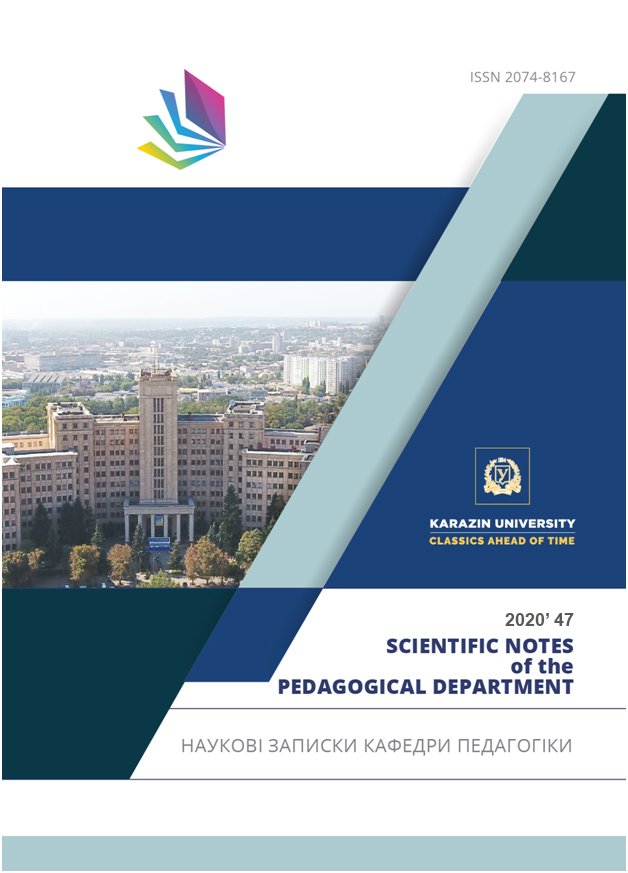Humour-oriented classes: crucial issues
Abstract
In the article presented humor has been considered as an integrant part of foreign language teaching that can facilitate more effective students’ learning. The purpose of this study is to identify the role of humor in teaching foreign languages at non-linguistic faculties in the conditions of shortening classroom hours and the most appropriate types of humor to use in a classroom for the successful acquisition of a foreign language by university students. To deal with the tasks and achieve the research purpose, theoretical and qualitative research methods have been used: the analysis of pedagogical and psychological works, the systematization of scientists’ views and achievements combined with many years of teaching experience and observations. It has been noted that humor can take many forms and perform a variety of psychological functions in modern society. At university humor helps to learn in two ways: right through the emotional sphere and stimulating the process of cognition and indirectly by means of creating a more welcoming atmosphere, which in turn has a positive impact on the success of knowledge acquisition. Humor has a powerful effect on mental activity and consequently, improving the capacity of involuntary memorization, causes a kind of reflexive orientation to novelty. Moreover, humor is an express method of psychological relaxation in class. Special attention has been paid to the impact of humor on the emotional state of students and finding the most appropriate types and forms of humor to be used in class. An attempt to prove the importance of using humor in class in order to improve students’ acquisition of a foreign language in a higher education institution, notwithstanding the shortening of classroom hours according to the language course has been made.
Downloads
References
/References
Головаха Е. И. Психология человеческого взаимопонимания. К. : Издательство политической литературы Украины, 1989. 190 с.
Лук А. Н. Эмоции и личность. М. : Издательство «Знание», 1982. 175 с.
Мартин Р. Психология юмора / пер. з англ. Санкт-Петербург : Питер, 2009. 478 с.
Харенко В. М. Эмоциональные средства регулирования межличностных отношений. Методика интенсивного обучения иностранным языкам. К. : Вищ. шк., 1988. C. 304–320
Шерковин Ю. А. Психологические проблемы массовых информационных процессов. М. : Мысль, 1973. 215 с.
Atkinson D. Humanistic approaches in the adult classroom: an effective reaction. ELT Journal, 1989. Vol. 43/4. P. 268–273.
Fredrickson B. L. The role of positive emotions in positive psychology. American Psychologist, 2001. Vol. 55 (3). P. 218–226.
Lefcourt H. M. Humor: The psychology of living buoyantly. New York : Kluwer Academic, 2001. 211 p.
McMorris R. Humour in educational testing: A review and discussion. Applied Measurement in Education, 1997. Vol. 10 (3). P. 269–297.
Nilsen A. P. Encyclopedia of 20th-century American humour. Phoenix AZ: Oryx Press, 2000.
Norrick N. R. Issues in conversational joking. Journal of pragmatics, 2003. Vol. 55(9). P. 1333–1359.
Oppliger P. A. Humour and learning: Communications and Emotions. Mahwah, NJ: Lawrence Erlbaum Associates, 2003. P. 255–273.
Stevick E. Humanism In Language Teaching. Oxford: Oxford University Press, 1990.
Wagner M. Urios-Aparisi E.The use of humor in the foreign language classroom: Funny and effective? Humor. 2011. Vol. 24. № 4. P. 399–434
Brenes Reyes, J. R. (2014) Make ‘em Laugh: Using Humour To Promote Learning in Language and Literature Classrooms. Teaching Innovation Projects, 4(2). URL: https://ojs.lib.uwo.ca/index.php/tips/article/view/3663
Golovaha E. (1989). Psihologiya chelovecheskogo vzaimoponimaniya [The psychology of human mutual understanding]. Kyiv, Ukraine: Izdatel'stvo politicheskoj literatury Ukrainy. (in Russian)
Luk A. (1982). Emocii i lichnost' [Emotions and personality]. Moscow, Russia : Izdatel'stvo «Znanie». (in Russian)
Martin R. (2009). Psihologiya yumora [The psychology of humor] (Trans. from English). Saint-Petersburg, Russia : Piter. (in Russian)
Harenko V. (1988). Emocional'nye sredstva regulirovaniya mezhlichnostnyh otnoshenij [Emotional means of regulating interpersonal relationships]. Metodika intensivnogo obucheniya inostrannym yazykam. (pp. 304–320). Kyiv, Ukraine: Vishcha shkola. (in Russian)
Sherkovin Y. (1973). Psihologicheskie problemy massovyh informacionnyh processov. Moscow, Russia : Mysl'. (in Russian)
Atkinson, D. (1989). Humanistic approaches in the adult classroom: an effective reaction. ELT Journal, Vol. 43/4, 268–273. (in English)
Fredrickson, B. L. (2001). The role of positive emotions in positive psychology. American Psychologist, Vol. 55 (3), 218–226. (in English)
Lefcourt H. M. (2001). Humor: The psychology of living buoyantly. New York : Kluwer Academic. (in English)
McMorris R. (1997). Humour in educational testing: A review and discussion. Applied Measurement in Education, Vol. 10 (3), 269–297. (in English)
Nilsen A. P. (2000). Encyclopedia of 20th-century American humour. Phoenix AZ: Oryx Press, (in English)
Norrick N. R. (2003). Issues in conversational joking. Journal of pragmatics, Vol. 55(9), 1333–1359. (in English)
Oppliger P. A. (2003). Humour and learning: Communications and Emotions. Mahwah, NJ: Lawrence Erlbaum Associates. (in English)
Stevick E. (1990). Humanism In Language Teaching. Oxford: Oxford University Press. (in English)
Wagner M. Urios-Aparisi E. (2011). The use of humor in the foreign language classroom: Funny and effective? Humor. Vol. 24(4). 399–434
Brenes Reyes, J. R. (2014) Make ‘em Laugh: Using Humour To Promote Learning in Language and Literature Classrooms. Teaching Innovation Projects, 4(2). (in English) URL: https://ojs.lib.uwo.ca/index.php/tips/article/view/3663

